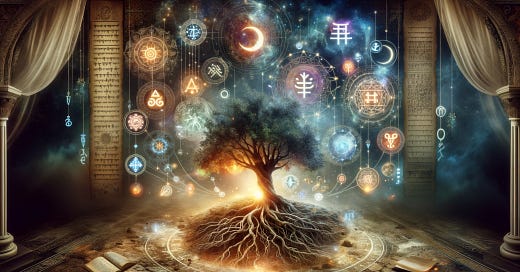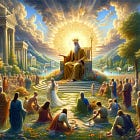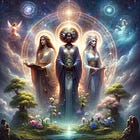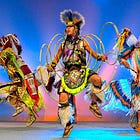Welcome to Polymathic Being, a place to explore counterintuitive insights across multiple domains. These essays take common topics and explore them from different perspectives and disciplines to uncover unique insights and solutions.
Today's topic wrangles with the idea of myths. Are they stories that are untrue or is there there something deeper that is just begging to be understood? Let’s step back and explore the deeper and more useful meaning in the ancient myths.
Intro
We often think of myths as stories that are untrue but what if that’s a completely wrong idea? Sure, they may not be perfectly factual or historical, the characters might be inflated or invoke ideas of gods, miracles, and magic, but what if that was a feature, not a bug? One way to think of myths differently is this quote:
Myth is the exact opposite of something that is untrue; actually, it is something that is so true, it is ever and always, irrepressible bubbling up from the soil of every alphabet, every language, every time, every culture.
- Stan Mitchell
There’s something there that just resonates with me because the further I’ve stepped away from the spiritual and looked back, the more I realized I was forcing the spiritual to be something it was never intended to be. This important nuance was explored in the essay Antifragility and the Bible where we often try to force the stories to be literal and factual when that ends up breaking the original intent they were trying to convey.
In that essay, I introduced the book Returning to Eden which I continue to recommend. On page 162 the author, Heather, recalls a conversation with a friend where she asked:
“Do you believe Jesus literally rose from the dead?”
To which her friend replied:
“Does it matter?”
Does it matter? It doesn’t not matter… but does it really matter? What is the actual story that’s being conveyed and does it lose meaning if it’s not literal? Personally, I feel it makes it much more approachable if it isn’t literal because we are asked to do the same thing, that is, be Christlike but that feels hard if he’s literally the son of God and we are failed humans. However, if we look at what the story is trying to convey there’s a powerful insight of dying to your ego, rising with a new mindset, and helping to bring heaven to earth which are all things we mere mortals can do.

Real vs. True
This theme exists everywhere because outside of Christianity, the world is full of myths from all cultures. Whether it be the Hindu creation story, the story of Buddha, our Germanic fairy tales, or even the truth in Santa Claus, each tells a story from which we can extract a better understanding of reality. Forcing a myth to be real is laughable across most cultures but that doesn’t mean the story isn’t true.
Let’s tease that one apart a little more. True vs. Real; Real vs. True.
writing for captured this fantastic insight in a recent essay on non-religious spiritualism:It’s weird that we have to say this because humans have known it since the beginning of time: regularly visit the mythical in the form of ritual, community, and prayer and then weave that inspiration into the fabric of your life by being better to family and friends, spouses, and community. It’s so obvious that it hurts — but it needs to be said.
He continues later in his conclusion as he shows that myth isn’t about bliss but stories that force us to face reality which includes our mistakes while also providing a path forward to become better:
In other words, it is a voluntary confrontation of the suffering of life in the name of love. Every wisdom tradition has figured this out. It’s not a secret.
This is a fantastic insight into how myths help us face our own foibles. Archetypes are another example that explains the negative realities about who we are as humans. Dozens of our mythologies across multiple cultures are based on archetypes of masculine and feminine. These identify the positive and negative inclinations of human psychology such as:
King vs. Tyrant: Leaders like Arthur (British) and Zeus (Greek) reflect the dual nature of power, where positive kingship nurtures society, and the tyrannical ruler harms it.
Warrior vs. Sadist: Warriors like Rama (Hindu) demonstrate honor, while Ares (Greek) shows how unchecked aggression leads to chaos, highlighting different cultural views on strength and responsibility.
Good Mother vs. Devouring Mother: Figures like Demeter (Greek) and Kali (Hindu) represent the nurturing and destructive powers of motherhood, showing how motherly love can nurture life or, if unchecked, can overwhelm it.
Wise Woman vs. Witch: Positive guides like Hecate (Greek) versus dark figures like Baba Yaga (Slavic) reflect the dual uses of wisdom, from healing to harm.
By exploring these universal figures, we see how myths reflect both the aspirations and cautionary tales of human experience, helping us understand and balance these forces in life. Looking back into the archives you may remember reading about the masculine in Benevolent Dictatorship, and the power of the feminine in Rediscovering the Goddess.
These stories are baked into fairy tales and myths throughout history. The story of the witch in Hansel and Gretel is a perfect example of the Devouring Mother, as is Mother Gothel from the story of Rapunzel, as perfectly captured by the Disney adaptation Tangled in the song Mother Knows Best.
But are they real?
It doesn’t matter because these myths contain truths we can spend years continuing to realize and understand. Forcing it to be real is silly and rejecting it because it isn’t real is just dumb. It’s OK to accept, embrace, and even apply myths because they are “something that is so true, it is ever and always, irrepressible bubbling up from the soil of every alphabet, every language, every time, every culture.”
Conclusion
The truth of myths is that they’re incredibly important to study, understand, reflect, and apply to our lives. Just as traditions are solutions to problems we don’t know exist, so too, myths contain millennia worth of hard-learned truths that give us a deep corpus we build on for our success.
It’s worth repeating that humanity’s superpower is that we learn socially. We don’t have to be uniquely smart because we are plugged into a culture full of traditions and myths that provide sophisticated answers to some of life’s most challenging problems. The key here is not forcing them to be The Truth but understanding that they contain thousands of truths and wisdom that we can apply to our own lives, even and especially in our world today.
Enjoyed this post? Hit the ❤️ button above or below because it helps more people discover Substacks like this one and that’s a great thing. Also please share here or in your network to help us grow.
Polymathic Being is a reader-supported publication. Becoming a paid member keeps these essays open for everyone. Hurry and grab 20% off an annual subscription. That’s $24 a year or $2 a month. It’s just 50¢ an essay and makes a big difference.
Further Reading from Authors I Appreciate
I highly recommend the following Substacks for their great content and complementary explorations of topics that Polymathic Being shares.
- All-around great daily essays
- Fantastic introduction to Stoic Philosophy
- Insightful Life Tips and Tricks
- Highly useful insights into using AI for writing
- Integrating AI into education
- Computer Science for Everyone











This is a fascinating topic! I’ve often thought about the roles of religion, myths, and traditions in our lives, but I’ve never written about them, so it will be interesting to see how my thoughts align with this discussion.
I agree that myths don’t need to be true to convey wisdom. As “The Truth of Myths” points out, myths are timeless stories that transcend literal reality, offering insights into human nature, morality, and the structure of society. Morgan Housel captures this perfectly:
“When a topic is complex, stories are like leverage.”
And
“The best story wins. Not the best idea, or the right idea, or the most rational idea.”
And
“Great ideas explained poorly can go nowhere while old/wrong ideas told compellingly can ignite a revolution.”
And another example from another great storyteller, Richard Feynman:
https://m.youtube.com/watch?v=N1pIYI5JQLE
We have seen the same thing from another author, Yuval Noah Harari. Is sapiens entirely accurate, or is there anything new in it? The answer is No. I will quote Harari here:
“I thought, ‘This is so banal!’ … There is absolutely nothing there that is new. I’m not an archeologist. I’m not a primatologist. I mean, I did zero new research. . . . It was really reading the kind of common knowledge and just presenting it in a new way.“
This highlights an important point: the power of a myth or story isn’t in its novelty or factual accuracy but in its ability to resonate with people and convey deeper truths.
Before the advent of widespread literacy, storytelling was the most effective way to pass on knowledge. Myths—whether religious, cultural, or even modern—served as tools to preserve wisdom, instill moral values, and create order in society.
I believe that myths, religions, and traditions all serve the crucial purpose of providing structure and meaning to human life. They help create shared values and ensure societal cohesion. For example, traditions like weddings or festivals celebrating the triumph of good over evil reinforce a sense of community and continuity. These stories and ceremonies have been passed down for generations, ensuring that certain norms and practices persist, promoting order rather than chaos.
Ultimately, myths are not static relics of the past; they are living, evolving narratives that continue to shape our world. I also think that this practice of creating and retelling stories has never stopped—and likely never will—because stories are how we make sense of our lives, our communities, and the world around us.
I really appreciate the heart and wisdom you weave into your articles, regardless of the subject. I noticed that right away in Paradox. I am just starting your second book. Paradox is one of those stories that stayed with me. It is extremely insightful and can’t help but think there are people in AI at big tech and investing firms that would benefit from reading your perspectives right now. 😊😂